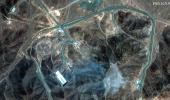'With the US having entered the war, raising the risks of a wider conflict, those impacts could be even more damaging.'

"lndia and several other States in its neighborhood have large expatriate communities around the Gulf region and wider Middle ," says South Asia specialist Dr Michael Kugelman.
"If there's a regional war, and especially if those countries hosting US military bases come under attack, then many of these expatriates may have to return home. And given that some South Asian States (think Bangladesh and Nepal in particular, but also Pakistan) are heavily dependent on remittances, the economic impact of those potentail expatriate evacuations could be considerable," Dr Kugelman tells Rediff's Archana Masih.
With America entering the Israel-Iran war, what help would it expect from Pakistan?
Now that the US has joined the war, I'd argue that from Washington's perspective, Pakistan's utility is greater when it comes to diplomatic assistance than military assistance.
The US has no need for Pakistani airspace or Pakistani bases, both of which were previously used by Washington at various times for military operations in Afghanistan (and even if the US asked, I doubt the Pakistanis would grant the request.
It would want no part in lending a military hand, even if indirectly, to a war launched by Israel.
But the geography is different with Iran. The US can depend on its bases in the Middle East and direct routes from there that lead to Iran, with no need for help from Pakistan.
By contrast, Washington might view Pakistan as helpful as a potential mediator -- a country that can urge Iran not to retaliate and to be willing to hold talks, in order to ensure the regime preservation that's so important to Tehran.
Pakistan has friendly ties with Iran, and (Pakistan army chief Syed Asim) Munir was part of a large delegation there just a few weeks ago.
I suspect Munir would have said, in his meeting with Trump, that both leaders share a desire for the war to end.
Pakistan, of course, has its own economic and security interests in wanting the war to end sooner rather than later. That said, I doubt Pakistan has the leverage to serve in a mediation role. While its ties are friendly with Tehran, there are strains, especially over cross-border terrorism, and there is also the shadow of Pakistan's alliance with Saudi Arabia.
Furthermore, Munir's recent friendly meeting with Trump and Pakistan's pitch for Trump to get a Nobel Peace Prize may be seen as liabilities by Tehran. So the US may be hoping for more than it can actually get with Pakistan on this front.

What impact is the Israel-Iran war going to have on India and the region?
The impacts could be dramatic, and overwhelmingly deleterious. And with the US having entered the war, raising the risks of a wider conflict, those impacts could be even more damaging.
The security impacts should be relatively mild, though Pakistan will need to be on guard for the possibility of anti-Iran militants taking advantage of Iran being distracted, launching attacks on Iranian forces and then crossing the border into Pakistan.
The Pakistanis would also be directly impacted by refugee flows if a wider war causes surges of IDPs (Internally Displaced Persons) in Iran to move toward the border with Pakistan -- though Pakistan may well close its border under such circumstances.
There's also the question as to whether Iran might try to recruit militia fighters from within the Pakistani Shia community to bolster its cadres of proxy fighters -- this is something Iran has done in the past.
It's the potential economic impacts, however, that are most worrisome. So much of the region has critical energy and broader trade interests with the Middle East, and the conflict could imperil the security of its supplies. Not to mention, India and other states in the region that send exports west to the EU and US could face major obstacles and higher costs.
If Tehran follows through on its threat to close the Strait of Hormuz, the impacts on trade-- and on oil prices -- could be very significant.
Finally, India and several other States in its neighborhood have large expatriate communities around the Gulf region and wider Middle East.
If there's a regional war, and especially if those countries hosting US military bases come under attack, then many of these expatriates may have to return home. And given that some South Asian States (think Bangladesh and Nepal in particular, but also Pakistan) are heavily dependent on remittances, the economic impact of those potentail expatriate evacuations could be considerable.
- Part 2 of the Interview: 'US Taking Relations With Pakistan's Generals To A Very Dramatic Level'
Feature Presentation: Aslam Hunani/Rediff










